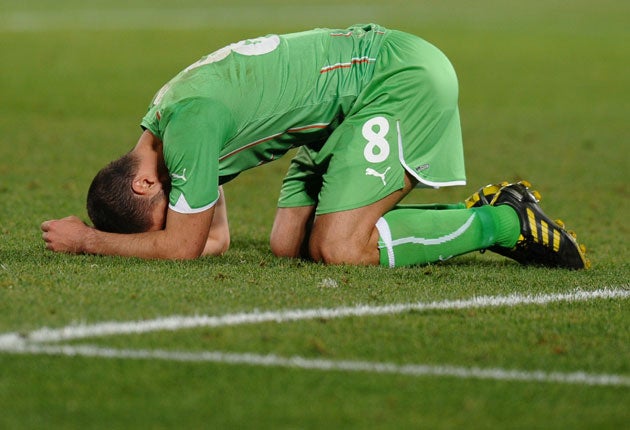Post-mortem begins after rout of Africa
Chance for glory on home soil dies amid negativity – now the region could have fewer teams in 2014

Ghana ingratiated themselves with all of Africa when the Black Stars kept up the continent's record of providing at least one second-round representative at the World Cup, as it has done at every event since 1986. Yet Africa expected so much more.
"We want to keep the cup in Africa," Aaron Mokoena, the captain of South Africa, said in May. The staging of the tournament in Africa for the first time offered a chance "for an African team to make a big impact", agreed Nigeria's Nwankwo Kanu. "Either to win the World Cup or get to the final."
The words sound all the more optimistic in hindsight but Africa had never known a better chance to reach their first semi-final. The quarter- finals proved the glass ceiling for Senegal in 2002 and Cameroon in 1990 but here in South Africa, Fifa had allowed a record six African nations to participate. Contrast this with Italia 90, where Cameroon and Egypt flew the pan-African flag.
Making little of the advantage of playing on African soil, Cameroon have been as disappointing in this World Cup as they were exciting 20 years ago. Paul le Guen's side were the first team to be eliminated and Nigeria, Ivory Coast, Algeria and South Africa made it five African sides out of six to exit in the first round. With just three wins from 18 group games involving African teams, the post-mortem has begun. How did Africa let this opportunity pass?
When Kanu said Nigeria could win the World Cup, he added this was only possible if his team played with "belief" and were "positive". At this tournament, it appears it is these qualities that have been most lacking across the African challenge.
"This is the first time we have been in a World Cup for 24 years," Algeria's coach Rabah Saadane reminded us after the Desert Foxes returned home without scoring a goal. "You should not expect miracles." In truth, Algerians knew what to expect from their team. Saadane made it clear before the World Cup that the height of his ambition was to "avoid humiliation" for the North Africans.
South African fans had similar aspirations for Bafana Bafana. The country feared they might lose all their games when the hosts were pooled with France, Uruguay and Mexico. They are proud of their victory over France last week, but when they look back on the tournament they might harbour some regrets.
It was not until the final game against France that Carlos Alberto Parreira's team were able to pose a major attacking threat. It proved too little too late.
While Algeria and South Africa had limited resources to make an impression at the World Cup, the same cannot be said for the Ivory Coast and Nigeria. The West Africans mostly played with their handbrakes applied, though, to the dismay of those expecting to see the flair last shown by near neighbours Senegal eight years ago.
"The players have failed to understand that they need to go that extra mile to be able to get results," Jay-Jay Okocha said after watching Nigeria finish bottom of the group. "They are not looking for solutions how to win games," added the man who did that for the Super Eagles in the Nineties.
CAF, the African Football Confederation, had hoped a strong showing in South Africa would see the region retain a six-slot allocation for Brazil in 2014. Following underachievement in South Africa, the continent is likely to see its representation clipped before the qualifying draws for that World Cup are made next summer.
Subscribe to Independent Premium to bookmark this article
Want to bookmark your favourite articles and stories to read or reference later? Start your Independent Premium subscription today.

Join our commenting forum
Join thought-provoking conversations, follow other Independent readers and see their replies